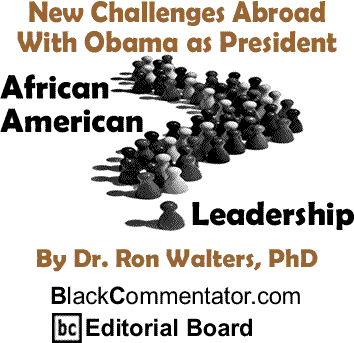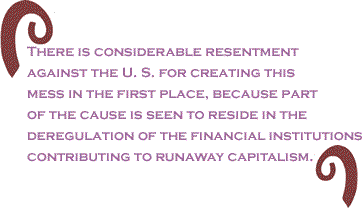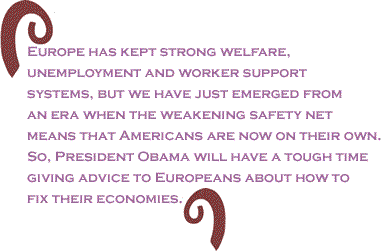
|
|||||||||||||||||||||||

|
|

Custom Search
|
|
 |
|
As President Barack Obama heads abroad he also heads into a difficult role as President of the United States in critical arenas. At the G20, he will be in an arena where the financial responsibilities of those countries for their former colonial territories (many of them in Africa) is at issue and where outlying pledges for economic assistance are critical to the viability of countries that are suffering. Meanwhile, these countries and their former colonial subjects as well are now suffering from the global economic crisis and there are new questions as to whether they are able to meet their pledges - considering that they formerly did not. This means that it may be difficult for Obama to leverage his out-sized popularity among Europeans to achieve concrete results at the G20 meeting. In this arena, there are rumors that some of the key countries are not prone to follow the lead of the U. S. in putting into place stimulus packages, as was done in the U. S. In fact, there is considerable resentment against the U. S. for creating this mess in the first place, because part of the cause is seen to reside in the deregulation of the financial institutions contributing to runaway capitalism. However, Americans should also understand that part of the resentment relates to the weakening of the safety net by politicians of both parties, such that citizens don’t have the income to spend the economy out of the slump. Europe has kept strong welfare, unemployment and worker support systems, but we have just emerged from an era when the weakening safety net means that Americans are now on their own. So, President Obama will have a tough time giving advice to Europeans about how to fix their economies.
The President said on a recent interview with Bob Schaefer of CBS that he is aware of the difficulty other countries have had engaging the Taliban in Afghanistan and that he want to use both military and diplomatic and economic assistance tools to achieve the goal of finding Osama bin Ladin and weakening the ability of his organization to strike at the U. S. That said, he could still be vulnerable to the neocons. I am suspicious when Bill Kristol agrees with the President and suggests that one of his aims is to “pacify the country” of Afghanistan.
Part of the delusion of the Bush strategy was to pacify, stabilize - and Americanize - Iraq to such an extent that it joined the Israeli side of the Middle East ledger. So, one hopes that American foreign policy in Afghanistan is even narrower, given the possibility that it will take a long war to “bring democracy” to that country as an indirect way of converting the Taliban to the war against Al Qaeda. Part
of the caution here is vested in putting too many eggs into the
Pakistani basket, such that if the basket burst, we will be holding
a rotten set of options. Pakistan is key to that struggle, but it
is also an unstable ally with a weak government, and probably parts
of it are Given his set of circumstances, the Obama administration should not give in to the generals’ future undoubted requests for more troops and a wider war in Afghanistan, setting us right back where we were in Iraq. Do we have an alternative? Yes. But then, he might have to use some his popularity at home to keep in perspective the primacy of the domestic political economy for now and into the foreseeable future. BlackCommentator.com Editorial Board member Dr. Ron Walters is the Distinguished Leadership Scholar,
Director of the African American Leadership Center and Professor
of Government and Politics at the University of Maryland College
Park. His latest book is: The Price of Racial Reconciliation (The Politics of Race and Ethnicity)
|
|
Any BlackCommentator.com article may be re-printed so long as it is re-printed in its entirety and full credit given to the author and www.BlackCommentator.com. If the re-print is on the Internet we additionally request a link back to the original piece on our Website. Your comments are always welcome. eMail re-print notice
If you send us an eMail message we may publish all or part of it, unless you tell us it is not for publication. You may also request that we withhold your name. Thank you very much for your readership. |
|
| |
|
| April
2 , 2009 Issue 318 |
|
| Executive Editor: Bill Fletcher, Jr. |
| Managing Editor: Nancy Littlefield |
| Publisher: Peter Gamble |
| Est. April 5, 2002 |
Printer Friendly Version
in resizeable plain
text format or pdf
format. |
| Frequently Asked Questions |
 |

|
 |
 |
 |
| |
| |




































